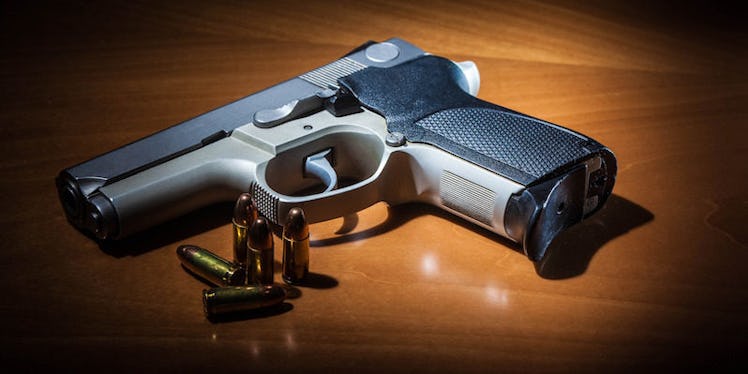
Why Millennials Will Be The Ones Who Eventually Put An End To Gun Violence
A Facebook argument. Joking around with a loaded gun. Because they were in an LGBTQ+ nightclub. These are just a few of the reasons people have been shot in the United States in 2016. These individual anecdotes are terrifying, but they also do not tell the entire story of gun violence in our country.
According to the United Nations Office of Drugs and Crime, there are just under 30 homicides by firearm in the United States per 1 million residents each year. Canada, probably the world's most comparable country to the United States, has 5.1. Germany has 1.9. Australia, just 1.4. The US is well off the spectrum of gun violence in industrialized countries, so despite the horrific violence we have all witnessed in Orlando, few could say incidences like this surprise anyone anymore. President Obama has addressed the media after at least 17 shootings.
There is an obvious cause to this epidemic of violence that costs tens of thousands of Americans their lives each year. Americans have a lot of guns. Roughly 4 percent of the global population calls the United States their home, but half of the guns in the entire world exist inside American borders. Americans own about 300 million guns, about 90 guns for every 100 persons. Canada and Germany have roughly one-third of that ratio, while Australia has about 20 per 100 residents.
This exceptionally easy access to firearms is what makes gun violence in America so prevalent. It means people that get in arguments have guns, it means people that joke with their friends have guns and it means people that want to do tremendous violence have guns. It comes as no surprise then, that gun ownership is strongly correlated with gun violence across both countries and states. It also comes as no surprise that people with a gun in their home are less safe statistically than those who don't.
The way to reduce this violence is simple in theory: Reduce the number of guns in circulation. In practice, that is much more difficult. On the policy front, it would take overturning Supreme Court decisions like Heller v. DC and also passing draconian laws that confiscate or seriously reduce the ability of people to buy guns. That is likely to be met with serious pushback and political fallout.
Culturally, however, the problem may be slowly sorting itself out. Young people, while they have about the same attitudes as their parents about gun control policies, are much less likely to own a gun. According to Pew, 40 percent of those age 50-plus report having a gun in the home, while those 18-29 report rates of only 26 percent. In another study, only 16 percent of youth said they personally owned a gun, while the figure for those 50-plus was nearly double that.
If young people continue to not buy guns at the rate of their parents, we may continue to see falling gun violence numbers. The conversation about seriously limiting the number of firearms in the United States is going nowhere fast with the powerful gun lobby and a deeply engrained culture that traces its roots back to the days of our Constitution.
It may be our only hope that Millennials just simply don't like guns as much as older people. This will mean, in the long run, that gun ownership trends downward, that violence becomes less common and that more kids and parents go home to their loved ones each year.
Gun violence is a serious problem in the United States that unfortunately has no real feasible policy solution at this time, but maybe, someday, people can feel a little safer while dancing in a nightclub. It's all up to us.
Citations: KETV, Orlando Sentinel, Vox, NPR, Mother Jones, Pew